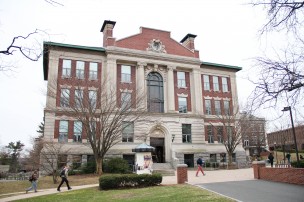In fall 2014, the Allbritton Center for the Study of Public Life will offer a Course Cluster Initiative open to rising sophomores, juniors, and seniors from any major. The initiative is a set of three courses revolving around themes of centralization and decentralization and the roles of both in political and economic life.
The program will be led by Chair of the Economics Department Richard Adelstein and Professor of Government John Finn. In the fall, those accepted into the cluster will enroll in either Finn’s course GOVT 153: Constitutional Law or Adelstein’s ECON 254: State and Economy in Industrial America, 1870-1940. Ten spots in each course will be reserved for Cluster students. Every student will also enroll in a year-long research seminar taught by both Finn and Adelstein.
“The purpose of the program, or at least the hope behind it, is that small groups of students and faculty will be able to work together in a longer time frame than one class gives you on a group…project that traverses different majors, different scholarly interests, and will lead to a collaborative scholarly project at the end of the year,” Finn said.
The first half of the seminar will split students into smaller research groups led by each professor to focus on developing research skills and a deeper understanding of the themes. In the spring, students will work with their teams on more extensive and thorough research projects.
“I don’t think we know exactly what that project will look like, but one of the things we’ve been talking about is having either individual students or groups of students working on scholarly projects or publications that may be published as a volume by [the Wesleyan University press], with [Adelstein] and I presumably being the editors, pulling this all together,” Finn said.
Dean of the Social Sciences and Director of Global Initiatives Joyce Jacobsen hopes the Cluster will be able to foster a sense of community through nonacademic means.
“In the spring, we would also bring in more speakers and other types of activities that would support a community when they’re not also taking the class,” Jacobsen said. “I know John Finn’s also planning, because he’s very interested in culinary arts, a recreation of famous dinners related to Federalist events of the 19th and early 20th centuries as an additional kind of fun, cohort-building activity for the students involved.”
The idea for the program came from Jacobsen and Provost and Vice President for Academic Affairs Ruth Weissman.
“We at the Allbritton Center have been trying to think of how to provide more programming for the University community at large,” Jacobsen said. “We also wanted to bring together both faculty at our University, faculty from other universities, and non-academics in a way that would combine research and learning and make clear what the connections are between the academic and nonacademic world in particular.”
Adelstein discussed his excitement at the prospect of exploring the theme of centralization and decentralization in his class.
“My course, like [Finn’s], will have material about the constitutional aspects of American federalism,” Adelstein said. “Interestingly though, I take a different view of it than [Finn] does, so I will teach some of the same material and draw different conclusions from it than he does.”
Professors at the Allbritton Center hope to expand the program in the coming years.
“Next fall we’re going to run an open call to all the faculty for them to propose future clusters so that, while we set up the first one to kind of get this going, we’re now going to ask the faculty at large to compose, as teams, other cluster ideas,” Jacobsen said.
Adelstein hopes that next fall and in future years the program will be able to attract students from all University disciplines.
“I would like to see as many students as possible in this cluster who are not economics or government majors,” Adelstein said. “I want to see some English majors. I want some biology majors. I want to see people who are just interested in this subject and want to immerse themselves in this and who will bring the perspective of a different discipline.”
The openness of the program appeals to students who are curious about subjects that may not be taught in courses related to their majors. Rowan Hyland ’17 is one such student.
“The program sounds like a really interesting opportunity to dig deep into an area of study that you might not usually get to work in because it’s unrelated to your major,” Hyland said. “I’m excited to see how it works out this year and what themes they’ll take on in the future.”

Comments are closed